Judi Lynn
Judi Lynn's JournalWant to Defeat Me? Do it at the Voting Booth, Lula Writes
07/19/2018 - 11H25
LUIZ INÁCIO LULA DA SILVA
Former President of the Brazilian Republic (2003-2010)
I have been imprisoned for more than 100 days. On the outside, unemployment is increasing, more and more fathers and mothers are finding themselves unable to support their families, and an absurd pricing policy for fuel caused a truckers' strike that provoked shortages in Brazilian cities. The number of people burned from cooking with alcohol is increasing due to the high price of natural cooking gas for poor families. Poverty is increasing and the economic outlook for the country worsens every day.
Brazilian children are being arrested and separated from their families in the United States, while our Government humiliates itself for the American Vice-President. Embraer, a high-technology company built over many decades, is sold for such a low price that even the market itself is shocked.
An illegitimate government is rushing through its last months in office trying to liquidate as much national patrimony and sovereignty as it possibly can - pre-salt oil reserves, natural gas pipelines, energy distribution companies, petrochemical companies -, beyond opening up the Amazon to foreign troops. While hunger is returning, and vaccinations for children have fallen, part of the Judiciary is fighting to maintain its own living allowance and, who knows, even manage to get a salary increase.
Last week, court Justice Carolina Lebbos decided that I cannot give interviews or record videos as a pre-candidate for the Workers Party (PT), the largest party in this country, which has selected me as their candidate for the Presidency. Apparently, incarcerating me isn't enough. They want to shut me up as well.
More:
https://www1.folha.uol.com.br/internacional/en/brazil/2018/07/1976244-want-to-defeat-me-do-it-at-the-voting-booth-lula-writes.shtml
Vatican-OK'd journal strikes out again at US evangelicals
Source: Associated Press
Nicole Winfield, Associated Press
Updated 1:19 pm CDT, Wednesday, July 18, 2018
VATICAN CITY (AP) -- A Vatican-approved journal has dismissed "prosperity gospel" as a pseudo theology dangerously tied up with the American Dream and President Donald Trump's politics, launching its second major critique of American evangelicals in as many years.
Two of Pope Francis' top communications advisers -- an Italian Jesuit and an Argentine Protestant pastor -- penned "The Prosperity Gospel: Dangerous and Different" for the current issue of the Jesuit journal La Civilta Cattolica, published Wednesday.
In the article, the authors note that the "prosperity gospel" and its belief that God wants his followers to be wealthy and healthy has spread throughout the world, particularly in Latin America and Asia, thanks to its charismatic proponents' effective use of TV and media.
But they point to its origins in the U.S. and its underpinning of the American Dream, and say its vision of faith is in direct contrast to true Christian teaching and Pope Francis' emphasis on the poor, social justice and salvation.
Read more: https://www.chron.com/news/politics/article/Vatican-OK-d-journal-strikes-out-again-at-US-13084738.php
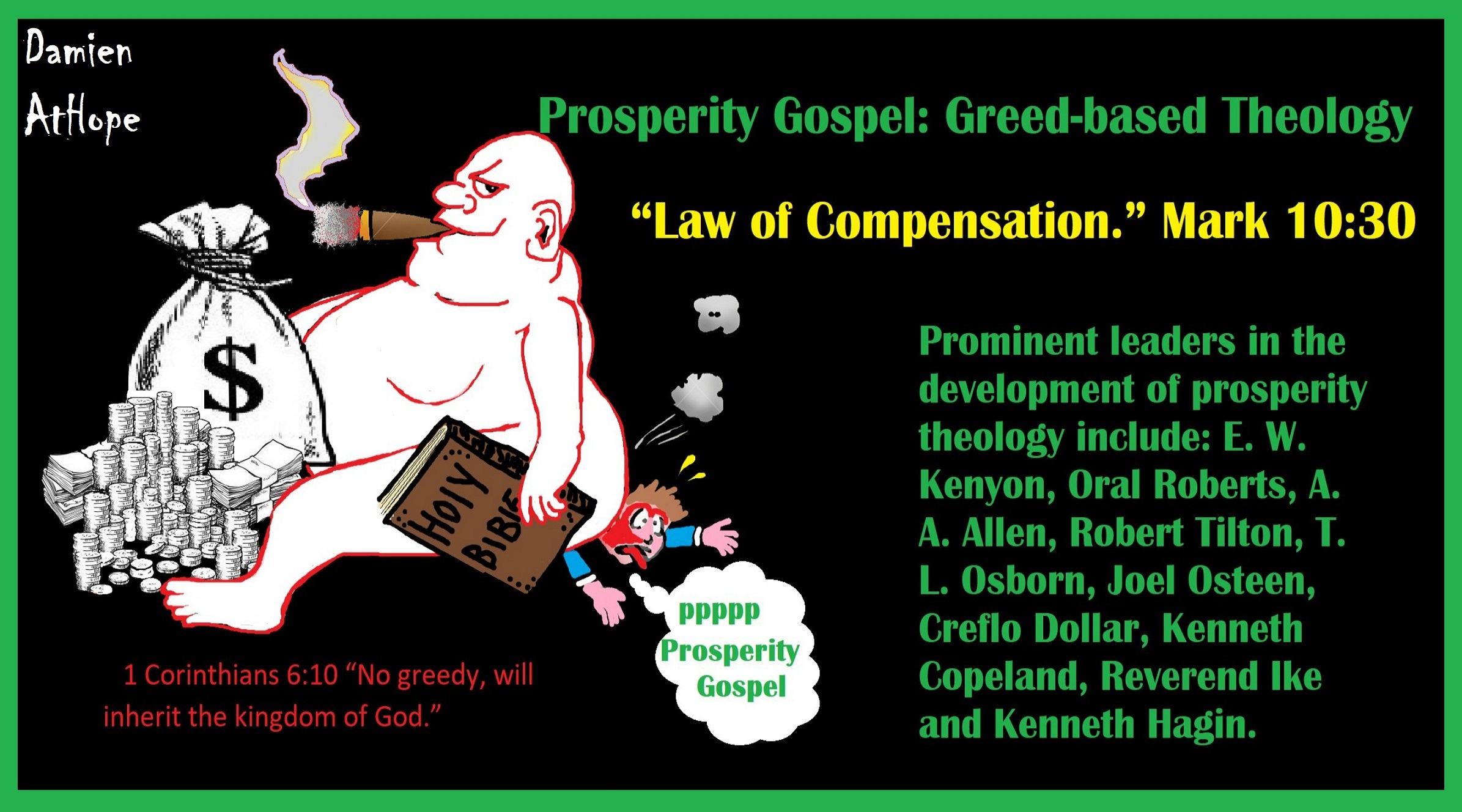
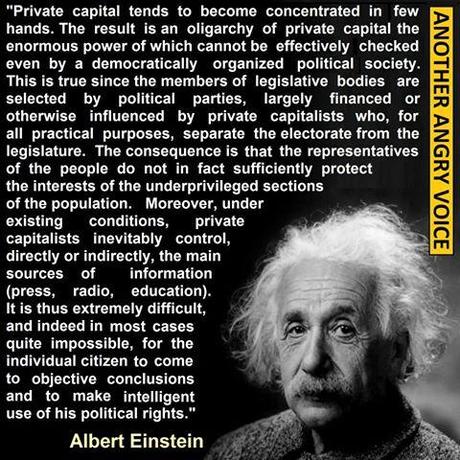
The narrative is still Lula
Vijay Prashad
JULY 19, 2018 00:15 IST
UPDATED: JULY 18, 2018 22:50 IST
As the elections in Brazil draw closer, conflict is likely
Luiz Inácio Lula da Silva waits in a 15 sq m room in a penitentiary which he himself inaugurated when he was the President (2003-2011) of Brazil. He has been condemned to this cell in Curitiba by a judicial process that has his supporters outraged and his detractors gleeful. A week ago, judges went back and forth over whether he could be released while he appealed a verdict on a corruption case known as Operation Car Wash. WhatsApp messages flashed across Brazil, the measure of the country’s polarisation evident in what was being said. By the end of the day, Mr. Lula remained in jail. His habeas corpus petition was not to be honoured.
Brazil faces a presidential election on October 7, and Mr. Lula is the candidate of the Worker’s Party (PT). It does not matter that he is in prison. The PT is adamant that it is either Mr. Lula or no one; there is no Plan B. An electoral court will decide, by late August, on the merits of allowing Mr. Lula on the ballot. Every poll taken in 2018 has shown him in the lead of his right-wing opponent, Congressman Jair Bolsonaro. There is little indication that Mr. Bolsonaro, who is deeply unpopular, will be able to better Mr. Lula.
Why Lula?
Mr. Lula’s tenure as President was not marked by any radical shifts in policy direction. His was a social democratic presidency at a time of high commodity prices — a benefit for Brazil’s faltering economy. He moved a considerable amount of public finances towards combating hunger and increasing opportunities for education. The social minorities gained from his programmes. Hunger, a serious problem in Brazil, vanished and new federal universities opened to great promise.
Mr. Lula’s successor, Dilma Rousseff, had to grapple (2011-2016) with the detritus of the 2007-08 credit crisis, the turbulence in Brazil’s economic situation, and a restive elite. Conciliation towards the financial class resulted in Ms. Rousseff losing support among the core base of the PT. But her term was to remain until 2018. Professor Valter Pomar, a national leader of the PT, says no political attempt by the elite was able to prevent either Mr. Lula from being re-elected in 2006 or Ms. Rousseff from winning in 2010 and 2014. The elite, worried that they would be defeated once more if they waited till 2018, and impatient to rid themselves of a social democratic government, conjured up street protests and urged a legislative coup against Ms. Rousseff. She was ejected and replaced by Michel Temer, who was far more acceptable to the elite. The economic elite were now given rights to exploit natural resources freely, ignore labour laws, and conduct financial transactions deleterious to the public exchequer.
More:
https://www.thehindu.com/opinion/op-ed/the-narrative-is-still-lula/article24454274.ece
Lost society hidden in Ecuador's 'pristine' cloud forest

MORLEY READ
Lost society hidden in Ecuador’s ‘pristine’ cloud forest
By Victoria Davis Jul. 17, 2018 , 3:30 PM
Tiny pieces of pollen and charcoal found in lake sediment in Ecuador’s Quijos Valley have revealed a detailed timeline of what happened to an indigenous people forgotten from history, National Geographic reports. Thousands of individuals made up the Quijo groups, which lived across the region in agrarian communities until the Spanish arrived in 1540s. Large nuggets of charcoal found in the silt marked the height of the conflict, and pollen spots showed the fast changing growth of plant life after the Quijos were eradicated from the area by 1578, scientists report in Nature Ecology & Evolution. The cultivated valley was quickly overtaken by forest, which grew undisturbed by humans for the next 130 years, eventually to be mistaken by botanists in the 1850s as part of the untouched cloud forest.
http://www.sciencemag.org/news/2018/07/lost-society-hidden-ecuador-s-pristine-cloud-forest
~ ~ ~

Ecuador's scenic cloud forests hide evidence for the agricultural communities that once thrived in the region.
PHOTOGRAPH BY JOEL SARTORE, NATIONAL GEOGRAPHIC
SCIENCE & INNOVATION
Traces of Lost Society Found in 'Pristine' Cloud Forest
Deep in Ecuador’s lush Quijos Valley, a society thrived—and then disappeared. But a lake preserved its story.
BY ALEJANDRA BORUNDA
PUBLISHED JULY 16, 2018
In the 1850s, a team of botanists venturing into the cloud forest in the Quijos Valley of eastern Ecuador hacked their way through vegetation so thick they could barely make their way forward. This, they thought, was the heart of the pristine forest, a place where people had never gone.
But they were very wrong. Indigenous Quijo groups had developed sophisticated agricultural settlements across the region, settlements that had been decimated with the arrival of Spanish explorers in the 1500s. In their absence, the forest sprung back. This process of societal collapse and forest reclamation is described in a new study published today in Nature Ecology and Evolution.
Linking Amazon and Andes
The Quijos Valley lies in one of the most biodiverse cloud forests in the world, along a pre-Columbian trade route that linked the rich Amazonian lowlands with the high Andes. Thousands of people lived there centuries before the Spanish arrived, farming maize, squash, beans, and even passionfruit in poor soil of the valley floor. [Learn about how cloud forests are drying up today].
The study's researchers found a tiny lake in the valley and dug down into the silt at the bottom, pulling up a plug of sediment that had built up over the last 1000 years—and found evidence of human occupation going back to the very oldest part of the core.
More:
https://www.nationalgeographic.com/science/2018/07/news-cloud-forest-quijos-ecuador-archaeology-pollen/
Death threats against journalists - or 'disguised guerrillas' as some in Colombia say - spike
by Adriaan Alsema July 17, 2018
Death threats against journalists in Colombia have spiked so far this year, according to the press freedom foundation.
Newspaper El Espectador reported Monday that the Prosecutor General’s Office promised to investigate recent death threats sent to journalists and newsrooms.
Hours earlier, the Foundation for the Freedom of Press (FLIP) demanded action against the growing aggression against journalists it said it has registered since January.
. . .
Journalist Maria Jimena Duzan of Semana magazine was told on Twitter on Sunday that she “should be raped, spat on, cut to pieces by a chainsaw and hanged on Bolivar Square.”
The journalist allegedly dishonored “the name of the paramilitaries” that were promoted by former President Alvaro Uribe in the 1990s and demobilized by the controversial politician between 2003 and 2006.
More:
https://colombiareports.com/death-threats-against-journalists-or-disguised-guerrillas-as-some-in-colombia-say-spikes/
Mexico: Pres-elect Amlo promises to create truth commissions for disappeared people
Last update: 18/07/2018
MEXICO CITY, July 18 (BERNAMA-NNN-TELESUR) -- Mexico's future secretary of the interior said the government of Pres-elect Andres Manuel Lopez Obrador will implement a national plan to repair relatives of victims and prevent further forced disappearances, as well as a new strategy to combat this national problem that has left tens of thousands missing.
"It's time to talk about memory and repair. We won't simulate a human rights policy and that there's nothing going on in Mexico. The State has been unable to prevent disappearances, of looking for the victims and finding out their whereabouts," said Olga Sanchez Cordero, the soon-to-be secretary of the interior.
In a forum called 'Oblivion, truth or justice', Sanchez Cordero pledged the future government will review the possibility of drug decriminalisation, repair victims and work on public policies aiming to recover and promote economic spaces and life projects as an alternative to the violent 'war on drugs.'
Speaking about drug decriminalisation, a controversial proposal that a great part of the conservative Mexican society opposes, Sanchez Cordero echoed the words of Lopez Obrador, who said he would do 'anything necessary to pacify the country.'
More:
http://www.bernama.com/en/world/news.php?id=1481313
Democrat Frances Tarlton "Sissy" Farenthold A Noble Citizen
Just found, by total chance, the fact that a Texas Republican Congressman, Rep. Blake Farenthold, who just got launched OUT of the House of Representatives for his congenital trashiness, as shown in this photo of him wearing his best yellow ducky pajamas, and sexual harrassment in his office in Washington, had a famous Democratic hard-working, widely respected step-grandmother who was extremely progressive, a member of the Texas Legislature, who ran for the Governor's office, and has been a constant anchor in Texas politics! Hooray! It appears her step-grandson, wierd Blake, actually hates women who don't bow down and kiss his gigantic backside! Or worse.
~ ~ ~ ~ ~ ~ ~ ~ ~ ~ ~ ~ ~ ~ ~ ~ ~ ~ ~ ~ ~ ~ ~ ~ ~ ~ ~ ~ ~ ~ ~ ~ ~ ~ ~ ~ ~ ~ ~ ~ ~ ~ ~ ~ ~ ~ ~ ~ ~ ~
This article reveals Sissy Farenthold has been a strong supporter of reform of the villainous military/industrial/racist/right-wing foreign "policy" against the people of Central America:
Frances Tarlton “Sissy” Farenthold
A Noble Citizen
PRESENTED BY THE BERNARD AND AUDRE RAPOPORT CENTER FOR HUMAN RIGHTS AND JUSTICE
Farenthold has been a fierce advocate for human rights and social justice in Central America, beginning in the early 1980s and continuing to this day. As a result of the contact she had with Salvadoran refugees at her law practice in Houston, as well as policy work in which she participated through other organizations, such as the Institute for Policy Studies (IPS) and the Council on Hemispheric Affairs, Farenthold became deeply involved in the issues of El Salvador. Francisco Lopez, who came to Houston as a refugee from El Salvador in 1985, recalls that she “became like a mother for us…She became the mother of our movement there in Houston, our rock.”[1]
In 1982, Farenthold made her first visit to El Salvador as a human rights observer. The delegation was led by Wayne Smith, a former diplomat to Cuba under President Jimmy Carter. Since then, she has visited El Salvador nine times, and traveled to Central America often to monitor and report on human rights. On one occasion in 1989, Farenthold met with the Salvadoran president to advocate for the release of detained human rights workers.
She has also made several visits to other Central American countries, including Guatemala and Honduras. In the mid-1990s, Farenthold visited Guatemala with U.S. lawyer Jennifer Harbury, whose husband, Efraín Bámaca Velásquez, had been disappeared by the Guatemalan Army in 1992. Farenthold joined Harbury in advocating for U.S. acknowledgment of its involvement in the disappearance of Bámaca through CIA operatives and informants. She testified before the Inter-American Court on Human Rights regarding the case, and in December 2000, the IACHR found the Guatemalan military guilty of the disappearance, torture, and murder of Bámaca.
Invariably linking human rights issues in Central America to those in the United States—often matters specific to Texas—Farenthold wrote to Assistant Secretary of Human Rights Richard Shattuck before leaving for Guatemala in the early 1990s: “We all know that the Guatemalan military does not exist in a vacuum. Some members are being trained in San Antonio.”
More:
https://law.utexas.edu/farenthold/international/central-america/
~ ~ ~

Making history: On Hillary Clinton, Luci Baines Johnson and Sissy Farenthold
Jul 27, 2016
Originally published July 27, 2016
Originally appeared in the mystatesman.com
Good morning Austin:
Last night, Hillary Clinton made history becoming the first woman to be nominated for president of the United States by a major party. I spoke yesterday with two Texas women who were in Philadelphia for the occasion who know something about being witnesses to history and about making history – Luci Baines Johnson and Sissy Farenthold.
. . .
Enter Sissy Farenthold, who will turn 90 on October 2.
When Farenthold was elected to the Texas House in 1968, she was the only woman in the House. Barbara Jordan was the only woman serving in the Texas Senate.
Four years later, Farenthold ran for governor.
From University of Texas Law School history of Farenthold.
In 1972, as the political fallout from the Sharpstown Bank scandal resonated across the state, Sissy Farenthold launched her first campaign for governor. She hadn’t planned to run for the office, in deference to U.S. Senator Ralph Yarborough, the leader of the liberal wing of the Texas Democratic Party. But when he decided not to run, she entered the gubernatorial race.
Farenthold’s campaign was buoyed by the bank scandal and the ethics reform movement she had led in the Legislature.
“Our present state leaders have run Texas like a cash register,” she said in a TV campaign ad. “The governor profits from the Sharpstown stock swindle. The lieutenant governor makes a fortune on private deals with special interests. Another candidate is a banker who is a back-up man for the big-business interests. It’s time to take Texas from the special interests.”
Farenthold competed against three candidates in the Democratic primary for governor, including a favorite of the state Democratic machine—Lieutenant Governor Ben Barnes, a protégé of former Governor John Connally. Barnes commanded the state Senate during the Sharpstown scandal. He was not implicated in the case, but his association with the politicians linked to the scandal tainted his reputation. The other candidates were Governor Preston Smith, who had profited from the stock deal, and Dolph Briscoe, a businessman who was not in state government at the time.
Farenthold shocked political observers when she outpolled Barnes and Smith, and forced Briscoe into a runoff election. Briscoe defeated Farenthold in the runoff with 54 percent of the vote. But “That Woman,” as critics called Farenthold, had established her political drawing power with 46 percent of the vote.
As remarkable as her run for governor was, it was not even Farenthold’s most significant contribution to political history that year.
More from UT:
This heightened role for women at the convention, which was held from July 10-13 in Miami Beach, Florida, came as they were entering a new period of political activity. About a year earlier, the National Women’s Political Caucus had been founded at a conference in Washington, D.C. And Brooklyn Congresswoman Shirley Chisholm was running for the presidency, the first African American from a major political party to run for the position.
Farenthold was recruited to run for the vice presidency when Chisholm, who didn’t have the votes to win the presidential nomination, turned down the Caucus’s offer to back her as vice president. Farenthold had attended the convention as the leader of the Texas delegates for U.S. Sen. George McGovern, who went on to clinch the party’s presidential nomination. But it wasn’t the first time her name had been mentioned for the vice presidency. Before the convention, a handful of students from Baylor University in Waco, Texas, had circulated a national petition to nominate her, and they brought 2,000 “Sissy for VP” posters to Miami Beach.
. . .
http://www.lbjlibrary.org/press/lbj-in-the-news/making-history-on-hillary-clinton-luci-baines-johnson-and-sissy-farenthold
~ ~ ~
Frances Tarlton “Sissy” Farenthold
A Noble Citizen
PRESENTED BY THE BERNARD AND AUDRE RAPOPORT CENTER FOR HUMAN RIGHTS AND JUSTICE
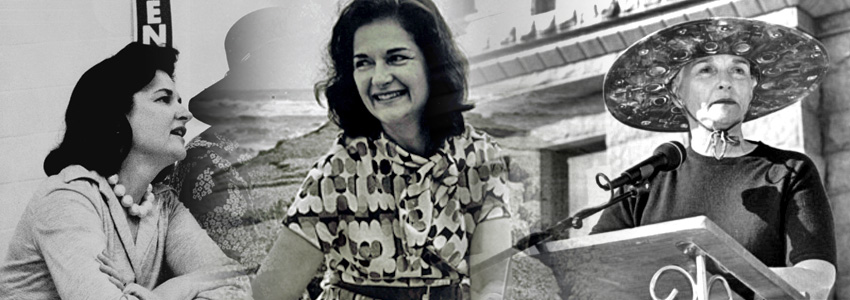
Frances Tarlton “Sissy” Farenthold was born in 1926 to a prominent Democratic and Catholic family in Corpus Christi, Texas. Her paternal grandfather was Judge Benjamin D. Tarlton Sr., Chief Justice of the Texas Court of Civil Appeals, state legislator and the namesake of the University of Texas Tarlton Law Library. Her father, Benjamin D. Tarlton Jr., served as the District Attorney for the 36th Judicial District in Hill County, and had a reputation as one of Corpus Christi’s most charismatic and effective attorneys.
Farenthold attended Hockaday School in Dallas, and graduated from Vassar College in 1946 at the age of 19. With the staunch support of her father, she graduated from the University of Texas School of Law in 1949, where she was one of only three women in a student body of 800.
After graduating from law school, Farenthold returned to Corpus Christi to practice law in her father’s firm. In 1950, she married businessman George Edward Farenthold. Together they had five children: Dudley, George Jr., Emilie, Vincent, and Jimmy. She was also step-mom to Randolph, George’s son from his previous marriage.
She took a hiatus from law practice while raising her young children. But she maintained her bar membership at her father’s urging, who paid her dues, and she became engaged in civic affairs. She served on the Corpus Christi City Council’s Human Relations Commission from 1963-1965.
More:
https://law.utexas.edu/farenthold/about/about-farenthold/
~ ~ ~
Gubernatorial Campaigns
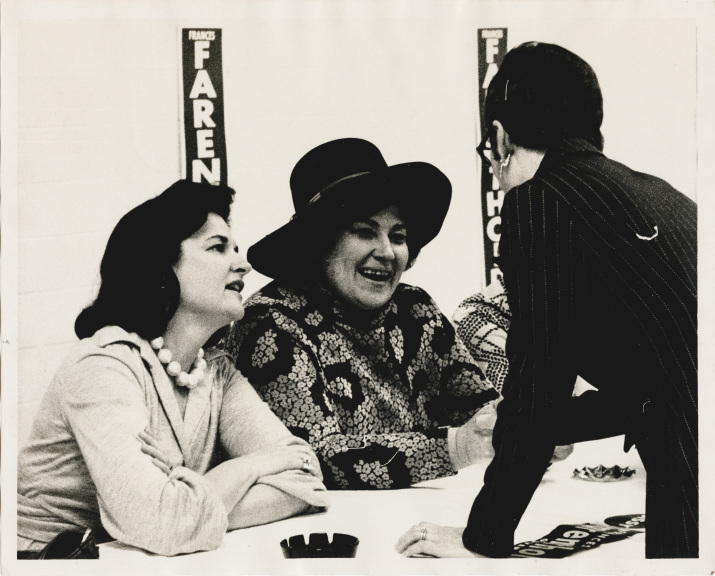
Photograph of of Frances “Sissy” Tarlton Farenthold and Bella Abzug with Farenthold campaign signs in background.
More:
https://law.utexas.edu/farenthold/state/gubernatorial-campaigns/
~ ~ ~

Texas State Rep. Ron Reynolds, Frances “Sissy” Farenthold, Congresswoman Sheila Jackson Lee, Rodney Griffin and Rev. Andrew Burks
~ ~ ~

08 MARCH 2008
Feminist Pioneer Feted at ACLU Anniversary Bash
Sissy Farenthold, image from Texas Legacy Project.
Houston's Farenthold wins ACLU honor
By MELISSA LUDWIG / San Antonio Express News / March 8, 2006
Trailblazers and hell raisers.
That may be the best way to describe Molly Ivins and Frances "Sissy" Farenthold, two women honored Saturday night at a gala toasting the 70th anniversary of the American Civil Liberties Union of Texas in downtown San Antonio.
Farenthold, 81, received the first Molly Ivins Lifetime Achievement Award, created to honor the spitfire Texas columnist who died last year.
"I am humbled because I know there are so many people who are worthy of it, and especially because it is in memory of Molly. To be associated, even in that way, is very moving to me," Farenthold said.
Farenthold was the first woman to be a serious nominee for vice president at the 1972 Democratic National Convention. Before that, she served with Barbara Jordan as one of two women in the Texas legislature, and was part of the so-called "Dirty 30," a group of lawmakers who rebelled against corruption in the speaker's office. She went on to serve as president of Wells College in Aurora, New York and as a human rights observer in Central America.
. . .
http://theragblog.blogspot.com/2008/03/sissy-farenthold-image-from-texas.html
Conflict in Central America: Why thousands flee their homeland in search of a safer existence
Conflict in Central America: Why thousands flee their homeland in search of a safer existence
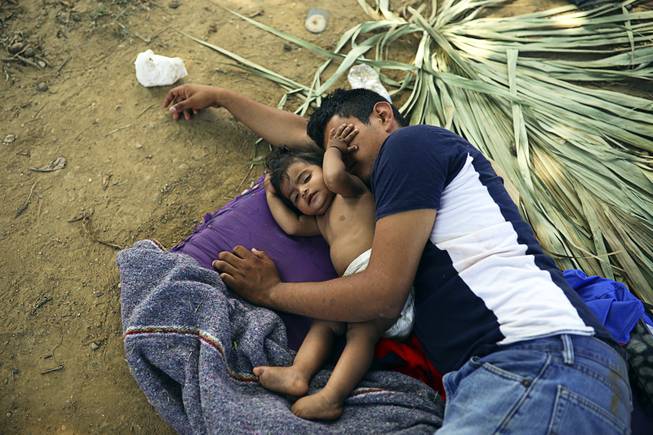
FELIX MARQUEZ / AP
Central American migrants rest during the annual Migrant Stations of the Cross caravan or “Via crucis,”
organized by the “Pueblo Sin Fronteras” activist group, inside a sports center during the group’s few-days
stop in Matias Romero, Oaxaca state, Mexico, Monday, April 2, 2018. A Mexican government official said
the caravans are tolerated because migrants have aright under Mexican law to request asylum in Mexico
or to request a humanitarian visa allowing travel to the U.S. border to seek asylum in the United States.
By Camalot Todd (contact)
Friday, July 13, 2018 | 2 a.m.
Before the Trump administration enacted a zero-tolerance policy, thousands of Latinos had already left their homes in Central America to begin the trek to the U.S. The journey through cartel-controlled states in Mexico is safer than what they face in Central America’s Northern Triangle, comprised of Honduras, Guatemala and El Salvador. With Nicaragua to the south, this geographic area accounts for many of the asylum seekers arriving at the U.S.-Mexico border. Between 2014 and 2016 alone, there were more than 8,900 asylum claims filed by individuals from this region, according to the U.S. Department of Homeland Security. The borders of these four countries foster political instability plagued by violence, weak or corrupt governments and poverty, all exacerbated by natural disasters, guerilla warfare, street gangs and the drug trade, according to the Council on Foreign Relations. Here are just a few of the main factors contributing to each country’s unrest.
GUATEMALA
• Immigration status in the U.S.: Guatemalan citizens do not have temporary protected status (TPS), but more than 3,300 Guatemalans have claimed asylum.
Why the region is destabilized:
• Warfare: Lasting from 1960 to 1996, almost 200,000 people disappeared or were killed during Guatemala’s 36-year civil war. The U.N.-sponsored Historical Clarification Commission reported that 83 percent of those individuals were indigenous Maya, and the majority of human rights violations were carried out by government forces. As of 2017, more than 242,000 Guatemalans were still refugees or internally displaced because of the civil war and ongoing drug cartel and gang violence.
• Drug Trade: Drug trafficking groups called transportistas take advantage of Guatemala’s poverty-stricken people and corrupt government to operate from the nation.
• Weak/Corrupt Government: Guatemala’s leading anti-drug investigator and his aides were arrested in the U.S. on charges of drug trafficking in 2005. The nation has a long history of authoritarian governments, with its most modern roots in the 1950s when the CIA supported a coup d’état against the democratically elected president Jacobo Arbenz. The U.S. viewed Arbenz as a communist threat and helped Colonel Carlos Castillo Armas, laying the foundation for the nation’s civil war. In 2007, three Salvadoran Central American Parliament members went to Guatemala for a meeting with other regional delegates. When they entered the country, they were murdered. Their bodies were found burnt on the side of the road. Guatemalan authorities arrested four police officers, according to InSight Crime, a foundation that studies organized crime in Latin and Caribbean nations
More:
https://lasvegassun.com/news/2018/jul/13/conflict-in-central-america-why-thousands-flee-the/
Far right group vows to exterminate all Colombia's social leaders
by Adriaan Alsema July 16, 2018
Far-right group Aguilas Negras has vowed to “exterminate” all Colombia’s human rights defenders and social leaders, calling them “guerrillas in disguise.”
In a death threat sent to dozens of organizations and individuals over the weekend, the group said that social leaders seek to “destabilize” the country and “obtain power.”
Colombia’s Defense Minister Luis Carlos Villegas has denied the existence of the Aguilas Negras and has clashed with Inspector General Fernando Carrillo who claimed last week that members of the security forces are taking part in the mass killing of leaders.
More than 311 social leaders have been assassinated by death squads and assassins since 2016, the year a peace process began with demobilized guerrilla group FARC.
Among those considered “military objectives” by the Aguilas Negras are “each and every supposed Victims Table on Colombian territory,” journalist organizations, minority groups, think tanks, congressmen and dozens of social leaders.
More:
https://colombiareports.com/far-right-group-vows-to-exterminate-all-colombias-social-leaders/
~ ~ ~
Earlier article:
Violence Continues in Colombia as the Peace Accords Advance
The country’s long civil war may soon end—but not without triggering a violent backlash from the narco-elite and the paramilitary groups they command.
By Greg Grandin Twitter SEPTEMBER 15, 2016
Before the United States elects a new president on November 8, a potentially more consequential vote will take place in the Americas. On October 2, Colombians will say yes or no to a peace agreement between the government and the FARC, an insurgent group whose roots stretch back decades, to the very beginning of the Cold War. It’s notoriously difficult to tally the number of the war’s victims, especially those who lived in the countryside, but this 2013 report by Colombia’s Historical Memory Group gives an idea of the scope of the brutality: hundreds of thousands dead, tens of thousands disappeared, serial massacres and systemic torture.
Perhaps the number that most challenges the imagination, especially when contrasted with the generally favorable coverage Colombia gets in the US press, relates to those driven from their homes and communities; 5.7 million people have been displaced over the last half-century, about 15 percent of Colombia’s total population. According to the report cited above, between 1985 and 2012—a period marked by increasing US involvement in the Colombian conflict, capped by Bill Clinton’s multibillion-dollar aid program, Plan Colombia—26 individuals every hour were displaced. Back in 1982, Gabriel García Márquez, in accepting his Nobel Prize for Literature, tried to convey the magnitude of “political disappearances” in Latin America to his Swedish hosts by invoking the Rapture: “Those missing because of repression number nearly one hundred and twenty thousand, which is as if no one could account for all the inhabitants of Uppsala.”
. . .
Some of this displacement was directly related to war, and can be blamed on the military and the FARC. But much of it has to do with the fact that the US-bankrolled counterinsurgency was cover for a massive paramilitary land grab. As the anthropologist Winifred Tate put it:
The Colombian countryside has experienced what is called ‘the reverse agrarian reform.’ Beginning in the 1980s, drug traffickers, many of whom became paramilitary leaders, began buying up land and using violence and threats to push people off the land. Victims reported being told, I’ll buy from you or your widow. Land was used to launder money and to buy their way into the respect of the elite. Much of this land has been taken over, directly or through third-party sales, by regional elites, agribusiness involved in teak, oil palm, or banana production, or the growing extractive industries. According to one estimate, as many as 6 million hectares of land changed hands. Nobody really knows—in many places, paramilitary groups burned land registries, while in other regions these registries are inaccurate, or the files lost or not maintained. At present, USAID reports that “in rural areas, less than 1% of the population owns more than half Colombia’s best land.”
In other words, Colombia’s long, long civil war has functioned as something like a war for the frontier, with paramilitary “settlers,” bankrolled not just by Washington, US corporations, and narco profits but also by international development banks, dispossessing smallholders. Many of the victims of this land rush were Afro-Colombian and indigenous communities, who make up a disproportionate percentage of the displaced. Mining, oil, and bio-fuel production have been the main drivers of much of the violent dispossession.
https://www.thenation.com/article/violence-continues-in-colombia-as-peace-accords-advance/
The women tricked into being sterilised
(This is 3 minutes long, and well worth the time.)
The women tricked into being sterilised
Josefina Quispe is one of hundreds of thousands of indigenous Peruvian woman who say they were forcibly sterilised by the state.
In April 2018 the state prosecutor ordered the indictment of former president Alberto Fujimori over the scandal, but he has not yet been indicted or charged.
Josefina told BBC World Service what happened to her and how she will never give up the fight for justice.
Video produced by Grace Livingstone and Trystan Young.
(Photo: Josefina Quispe. Credit: BBC)
Release date: 9 July 2018
https://www.bbc.co.uk/programmes/p06d7pzj
Profile Information
Member since: 2002Number of posts: 160,525
